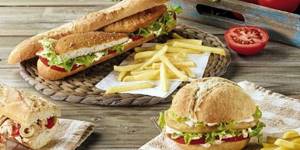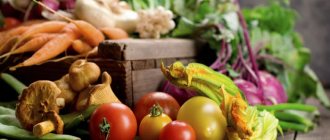In nutrition - a sensation! It turns out that to be slim, you need to constantly eat something.
This is exactly the tactic that followers of the new weight loss system – “ grazing ” – adhere to. And, I must say, not in vain: this diet allows you to lose up to 15 extra pounds.
A technique called “grazing” appeared in the West several years ago. True, this is not a completely new way to lose weight. In fact, grazing is just one of the options for fractional feeding .
According to the laws of this weight loss method, you need to eat every two hours. Therefore, now, in addition to breakfast, lunch and dinner, your diet should also include a second breakfast, an afternoon snack and a light snack one and a half to two hours before bedtime. In a word, if you want to lose weight, eat as often as possible. As experts say, the secret of “harmless gluttony” lies in our body, namely in the hormone ghrelin . It was discovered by Japanese scientists at the end of the last century. It turns out that it is produced by the stomach lining and stimulates hunger receptors in the brain, prompting you to eat something. Moreover, the more time passes after the last meal, the hungrier the hormone becomes, as a result a brutal appetite appears, and hence a passion for huge portions. With constant light snacks, ghrelin simply does not have time to be produced in the required quantities, and you feel full all the time. Rehearse your diet
Despite the fact that the main motto of grazing is “Eat as often as possible,” this does not mean that you can make a sandwich with sausage for breakfast, have a plate of borscht for lunch, snack on a cutlet and flavor it all with a portion of cake, and in the evening taste dumplings, at the same time, between main meals, also drink sweet tea with colleagues. This approach will not lead to slimness, but, on the contrary, will aggravate the problem. Therefore, when setting out on the path of grazing, remember that from now on you will have to completely reconsider your nutrition system. First of all, you need to forget about full meals with the first, second and compote. Now their place will be taken by light snacks. If it is difficult for you to immediately give up your usual lunches and dinners, conduct a so-called grazing rehearsal. Start by drinking a glass of milk or eating a piece of grain bread half an hour before lunch. And in general, as soon as you feel hungry, make it a rule to nibble on bread or crackers. This trick will help reduce your appetite, and it will be easier for you to control yourself at lunch. By the way, according to nutritionists, thanks to snacks you end up eating 10-15% less. And this equates to five centimeters at the waist! For breakfast, lunch and dinner - 300 kcal. As soon as you get used to the fact that even a glass of juice is a meal, start counting calories. First of all, forget that you can eat whatever you want for breakfast under the pretext that the buns, fried potatoes and cake will “burn” during the day. According to grazing, the calorie content of the morning meal, lunch and dinner should be approximately equal, 300 kcal each, and a snack cannot exceed 100 kcal. Thus, you will receive 1500 kcal of energy per day. At the same time, under no circumstances should you skip any of the snacks, no matter how insignificant it may seem to you. In order for your diet to not only please you with the indicators on the scale, but also bring you pleasure, you need to correctly create a menu for the week. It is advisable that the products are not repeated, otherwise you will quickly get bored with low-calorie dishes and your hands will reach for something harmful. To ensure that you don’t accidentally end up with chips and crackers on your snack list, make a grazing list - this will make it easier for you to control the caloric content of what you eat. Fruits and vegetables should come first, followed by fermented milk products, cereals, fish and meat. Don’t forget about soups: they help you quickly fill up and at the same time do not contribute to the accumulation of extra pounds. Just be careful with borscht - its calorie content is too high.
What is the grazing diet?
Japanese scientists, studying the peculiarities of the functioning of the digestive system, isolated the hormone ghrelin. One of its main functions is to stimulate the feeling of hunger. This knowledge was used to create a special diet. Grazing is a special fractional meal. Translated from English, the word means “touch”, “graze”, which reflects the principles of constructing a diet.
While on a diet called grazing, a person needs to eat every 3 hours, and the volume of a single serving should fit in the palm of his hand. Frequent meals (at least 6 times) during grazing help to “deceive” the feeling of hunger and, at the same time, reduce the amount of food eaten, which leads to intense weight loss in a short period of time. Every 2 weeks, strictly following the diet rules, you can lose up to 10 kilograms. This is an excellent indicator for “nourishing” methods of losing weight, characterized by a smooth and slow elimination of excess fat.
A properly selected diet during grazing helps not only to lose weight, but also to normalize the functioning of the gastrointestinal tract (hereinafter referred to as the GIT).
While “sitting” on this diet, you cannot eat all foods. You should carefully select your diet, calculating the number of calories coming from food. It should not exceed 1500-1800 kcal. In order to suppress your appetite, not to “break down” and complete the diet course, try not to deviate from the established rules.
Contraindications
The hunger hormone that we are going to fight with this diet is closely related to another hormone, insulin. Therefore, people suffering from diabetes should not follow such a diet. Since any fluctuations in insulin levels are undesirable for them.
Naturally, you should also give up experimenting with diets if you have an acute course of any illness.
People suffering from anorexia and excessive obesity should also be careful about this diet. Only after consulting with a nutritionist can you decide whether to live on this diet.
Advantages and disadvantages
The diet for grazing is close to the recommendations of gastroenterologists who develop individual diets for people suffering from diseases of the gastrointestinal tract: chronic gastritis, colitis, biliary dyskinesia, stomach ulcers. The main advantages of this method of losing weight:
- By eating every three hours, those losing weight do not feel hungry.
- Reducing the amount of food you eat promotes rapid weight loss in a short period of time.
- The incoming food does not contain “bad” cholesterol and a large amount of salt, which has a beneficial effect on the functioning of the gastrointestinal tract.
- Metabolism accelerates, waste and toxins are quickly removed from the body.
- The immune system is activated.
- The condition of the skin and hair improves.
- Mood stabilizes.
The disadvantages of grazing include the fact that you won’t be able to lose 5-8 kg of weight quickly (in a week). In addition, there are contraindications to the use of the diet. Grazing should not be used when:
- exacerbation of any chronic disease;
- pancreatitis and diabetes mellitus;
- excessive obesity or emaciation.

Do you want to eat constantly? To your health.
This is the main advantage of fractional nutrition . to snack on something . Grazing requires that you eat often. And this is caused by the hormone “ghrelin”, which is produced by the mucous membranes of the stomach and encourages us to go to the refrigerator for something tasty. It provokes the emergence of an insidious appetite , which we try to pacify. However, if you constantly snack little by little, then this hormone does not have time to be produced in significant quantities, and the desire to eat is blocked.

Terms of use
In order to achieve a visible effect when grazing in the shortest possible time, you need to strictly follow the basic rules of this nutrition system. These include the following recommendations from nutritionists:
- Eat slowly, without trying to empty the plate completely. Remember that in 2-3 hours you will definitely eat again. You need to get up from the table with a slight feeling of hunger.
- For snacks, use compressed grain breads. With a minimal content of fats and carbohydrates, they perfectly satiate and prevent the development of an obsessive desire to snack on something high-calorie.
- Be sure to drink water, at least 1.5-2 liters per day. This helps suppress appetite and helps speed up metabolism.
- Sugary drinks should be excluded from the diet; they stimulate the production of gastric juice and cause hunger.
- Prepare your food in advance so you don’t have to look for something to eat at work. Bring an apple, dried fruit, yogurt or nuts.
- Drink a glass of clean water at night - this will help speed up your metabolism and speed up weight loss.
- If you engage in intense physical exercise, after which you feel hungry, then during grazing, switch to gentle sports - walking, slow running, cycling.

What is the essence of the diet?
- All meals should be small, it would be better to have 6 than 3-4.
- Snacks should be every 3-4 hours, and you should eat in small portions, chewing food slowly.
- Portions should be small and served in shallow plates.
- Meals do not involve a set lunch consisting of several courses at once; here, each meal is a separate dish.
It is important to take care of changing your lifestyle and sleep patterns when losing weight:
- Every day you need to do physical exercises, walk in the fresh air, you can sign up for a swimming pool, athletics classes, gradually increasing the load.
- Remove from your diet all unhealthy foods, chips, crackers, candies, cookies, fast food, baked goods.
- Avoid fried, smoked, salty and spicy foods; it is better to steam or boil everything.
- Introduce more fruits and vegetables into your daily menu, which are rich in vitamins and minerals necessary for a growing body.
- Plenty of water, a ban on carbonated and sugary drinks.
- 8 hour sleep.
All these principles are also typical for other diets, which indicates the usefulness and correctness of such a dietary regimen.
What can you eat
Grazing compares favorably with other methods of getting rid of extra pounds due to its democratic approach to the food consumed. Almost all products are allowed to be used. Nutritionists only limit the methods of their preparation. In the grazing diet, the main emphasis is on the frequency of eating and reducing standard portions.
When grazing, you need to eat raw, boiled, steamed food. Allowed to use:
- fresh fermented milk products with a minimum amount of fat and sugar - cottage cheese, sour cream, yogurt, kefir;
- vegetables, fruits, herbs, berries;
- eggs, boiled “in a bag” or “hard-boiled”;
- lean meat of rabbit, chicken, turkey;
- any seafood and lean fish;
- olive oil, rich in unsaturated fatty acids;
- hard cheese;
- all porridges - buckwheat, rice, oatmeal, flaxseed, pearl barley, barley.
The grazing diet is suitable for snack lovers. It is believed that with this method of losing weight, a person chews something all the time. The portions are very small, and the number of calories consumed daily will have to be calculated specifically. Nutritionists recommend constantly adding variety to your diet when grazing to avoid the temptation to break your diet.
Fruit with bread?
Some representatives of the fair sex, wanting to lose weight, try to keep their refrigerator constantly empty. In fact, this approach is fundamentally wrong. When there is nothing on the table, we intuitively begin to look for food. As a result, when we are really hungry, we run to the store for instant food products. And this cannot but affect the figure. So as soon as you've made your grazing list, head to the supermarket to replenish your supplies. Your refrigerator should contain yogurt, bread, cottage cheese, fish, chicken, meat, muesli, and vegetables. Pay special attention to fruits. Unfortunately, not all of them are friends of grazing. First of all, you will have to give up bananas - they are too high in calories. Also, don’t go overboard on avocados (100 kcal) and grapes (70 kcal). The lowest calorie fruits are apples, tangerines and plums. Oranges, pineapples and peaches have a higher energy value but can be used as snacks. Just keep in mind that fruit in its pure form is not as good as it seems. The fact is that they contain a lot of fruit acids that cause appetite. Therefore, it is better to add juicy fruits to salads, and they should be eaten with bread. It neutralizes acids, resulting in a quick feeling of fullness after a snack.
What foods should you exclude?
This set of weight loss measures does not have strict dietary restrictions; you are allowed to consume a large number of foods, but do not think that you can eat everything. While grazing, you need to avoid:
- fried meat, vegetables, food cooked in a deep fryer;
- semi-finished products with preservatives and flavorings that stimulate appetite;
- fast food products
- baked goods, cakes, sweets, products made from yeast dough;
- any fatty foods;
- alcohol;
- smoked meats
The diet is based on natural food and the maximum removal from the diet of foods high in fat, which are then deposited on the sides, hips, and waist. All alcohol-containing drinks should be completely excluded from the diet, since alcohol stimulates appetite and causes the liver to work harder, processing incoming toxins.

Poor sleep and obesity.
overeating is to blame . During the working day, many of us do not have breakfast or lunch, and when we come home, we begin to eat everything that our eyes can see. And all this for the night . As a result, we don’t get enough sleep, and we also gain extra pounds . Melanin, which is produced during sleep, is responsible for this. It is what promotes the breakdown of fat . Poor sleep leads to weight gain. So think about it!
Grazing diet menu for a week
You need to eat a varied diet, trying to eat new foods every day to avoid the temptation to eat forbidden sweets or fatty foods. You can drink compotes, tea or coffee, without adding sugar. When grazing, freshly squeezed juice is allowed, but it replaces one full snack. If you want to lose weight following these recommendations, check out the approximate diet:
| Days of the week | Breakfast | Snack 1 | Dinner | Snack 2 | Afternoon snack | Dinner |
| Monday | Buckwheat porridge with milk, two pieces of prunes | Apple | 50 gram piece of boiled turkey meat, a glass of broth | Banana | Yogurt without additives | 50 gram piece of boiled trout and fresh tomato |
| Tuesday | Cottage cheese with sour cream, a glass of milk | Orange | Vegetable soup with a piece of boiled chicken | Grapefruit | 50 g cashew nuts, a glass of fresh juice | Rice porridge, hard-boiled egg |
| Wednesday | 2 grain breads, a glass of kefir | Fresh carrots | Potato soup with a piece of boiled fish or meat | Rice porridge with butter and pear | Apple | Vegetable stew |
| Thursday | Bun with butter, a piece of cheese, a glass of milk | 2 oranges | Mashed potatoes with milk, a piece of baked turkey | A glass of juice | Apple and carrot salad dressed with yogurt | Omelet based on one egg with tbsp. l. green peas |
| Friday | Vegetable Salad | Apple | Chicken broth with croutons and boiled egg | Cottage cheese | Dried fruits to taste | Buckwheat porridge with milk |
| Saturday | Oatmeal with milk, apple | Cereal bread with butter and honey | Pea soup | A piece of boiled fish, fresh cucumber | Fresh peach | Piece of boiled chicken, tomato |
| Sunday | A piece of cheese, bread, tea without sugar | Fresh fruit puree – orange, banana, apple | Flaxseed porridge, fish baked in foil | Fresh grapes or raisins | 2 Lenten cookies, kefir | Fresh cabbage and carrot salad dressed with sour cream or yogurt |
Fractional grazing nutrition: arguments for
The more often a person snacks, the less he eats as a result, since he doesn’t need many calories to feel full. And your appetite is under control because your blood sugar level is maintained at an optimal level. The less frequent the meals, the stronger and more unbridled the appetite, the greater the total daily caloric content of what is eaten. This pattern was confirmed at the end of the last century by Japanese scientists, who, as always, were ahead of the curve and discovered the hormone “ghrelin” to the world.
It turned out that the hormone is produced in the body by nothing other than the human stomach mucosa. And the more time passes since the last meal, the more hormone is formed. Of great interest is the fact that ghrelin actively stimulates the hunger center in the brain, so its excess makes a person weak-willed in front of a table richly laden with various dishes. If you periodically allow yourself small snacks, the hormone does not have time to be produced and it is much easier to control your own appetite.
The big plus of grazing nutrition is that it helps normalize sleep, which plays a big role in losing weight and maintaining a certain weight. It's no secret that heavy dinners cause problems with falling asleep and sleep quality, which significantly worsens. During sleep, melatonin is produced, which is necessary for the breakdown of fats. When the hormone is insufficient, the fats supplied with food are only partially broken down, mostly being deposited in problem areas. A light snack before bed does not affect falling asleep, melatonin is produced normally, and accordingly, the process of fat breakdown is not disrupted.
The grazing diet for weight loss allows you to maintain vigor, efficiency, a clear mind throughout the day and at the same time increase energy expenditure. As a rule, large portions of food eaten cause active blood flow to the walls of the stomach. This happens due to a decrease in blood supply to the brain and muscles. Therefore, after a hearty lunch, you usually feel sleepy and become too lazy to move and think. An undoubted advantage is that grazing nutrition is fractional meals - an ideal regimen for a healthy gastrointestinal tract. The 5 Factor Diet of Harley Pasternak is based on the principle of fractional nutrition, allowing you to lose weight, but at the same time feel cheerful and energetic.
Grazing meals vs three meals a day
Absolutely all people live according to their own biological clock. When a person has followed a three-a-day diet for years, his biorhythms work accordingly, regulating, among other things, the processes of fat breakdown and metabolism. The production of enzymes necessary for normal digestion and absorption of food also occurs at a certain time. Maybe that’s why French women, eating three times a day, calmly allow themselves a delicious croissant at breakfast or a crispy white baguette with butter and marmalade, a couple of glasses of dry red wine at dinner, as Roger Corder recommends in his wine diet for weight loss, and are not afraid get better. They consider snacking to be an indulgence and the main culprit of excess weight.
Most boarding houses and sanatoriums also provide three meals a day - the sanatorium-resort diet. If you follow such a nutritional system, where most of the daily energy value comes from breakfast and lunch, during the rest period many people note that the annoying kilograms have gone away and their figure has become slimmer. With three meals a day, usually the largest daily fat intake occurs at lunch, when you can afford high-calorie cheeses, dessert, steaks and hearty, hearty side dishes. But dinner looks, although not hungry, but very modest: lean poultry or fish, light vegetable salads and no fatty dressings or high-calorie sauces.
The disadvantages of eating three meals a day are that it is not easy to stick to this regime on weekdays, unlike the grazing diet. It is extremely difficult to leave the office at lunch and find a decent and inexpensive place that will offer a balanced lunch. Most often, on weekdays, the morning begins with a cup of coffee, and for lunch we usually eat something that can be ordered delivered directly to the workplace (pizza, fried grilled chicken). Or any other fast food sold in fast food stalls nearby (burgers, shawarma, sandwiches). Therefore, at dinner, a tired and hungry person simply pounces on food, unable to control his appetite and consumes more calories than he should.










